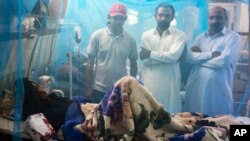As the Ebola epidemic rages on in western Africa, there’s concern that another disease - which sickens and kills more people globally - is largely being ignored. Dengue fever, which is transmitted by mosquitoes, continues to spread in countries, including India and Malaysia, where nearly half of the world’s population resides. But a long-sought vaccine offering some protection against dengue may soon become available.
Dengue fever causes debilitating flu-like symptoms, rashes, headaches and severe muscle and joint pains. For that reason, the infection is sometimes called “breakbone disease.” Like Ebola, dengue is considered a hemorrhagic disease, resulting in death in the worst cases.
Scott Halstead is senior scientific advisor to the Dengue Vaccine Initiative, an international consortium of scientists and lay people dedicated to the development of a vaccine.
Unlike Ebola, which - in the current epidemic - has so far infected more than 14,000 people in West Africa, Halstead says the scope of dengue is enormous, with up to 100 million infections every year, mostly across Asia.
“I think people in the dengue field feel, 'Golly, ooh, we’re going to be pushed into the shadows.' But because hundreds of thousands, maybe millions, of people require clinical care, it’s a problem. It’s in your face but it’s all over the place," said Halstead.
There are four dengue viruses, all spread by mosquitoes. Surviving infection by one strain provides lifelong immunity against that type but does not protect the person from future infection by the other strains.
Two years ago, a candidate vaccine developed by the French pharmaceutical company Sanofi Pasteur was tested in a group of 4,000 Thai schoolchildren and did not perform as well as hoped. Only 30 percent of the children were protected against infection. The researchers' goal was a vaccine that was 70 percent effective against all types of the dengue virus.
Now, in advanced clinical trials conducted in five Latin American countries involving almost 21,000 healthy children, the company is reporting promising results with the same vaccine.
In an article published early this month in the New England Journal of Medicine, Sanofi reports the vaccine offered 60 to 80 percent protection, resulting in fewer hospitalizations. The children were followed for two years to see if they came down with the disease.
Halstead says the drug seems to work best in those who have already been infected with one of the dengue viruses.
“So this seems to be what this efficacy is largely due to, which is boosting the immunity of people who are already partially immune," he said.
Halstead says the vaccine failed in Thailand because most of the treated kids who became infected were stricken with dengue type 2, the strain of the virus that’s proven to be the most difficult of the four to prevent.
With future clinical trials planned, Sanofi researchers hope to learn more about how the vaccine protects against dengue fever, with an eye toward improving its effectiveness.




